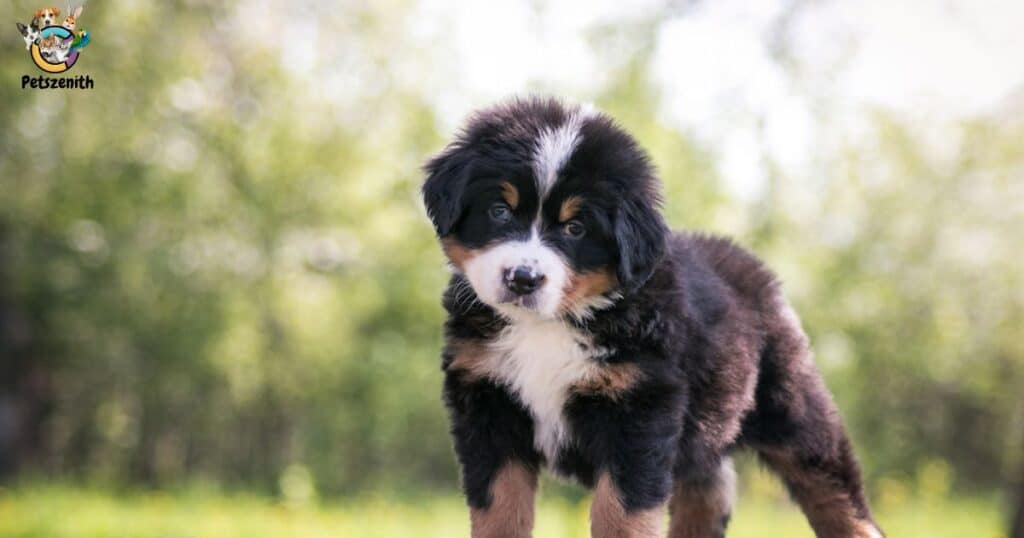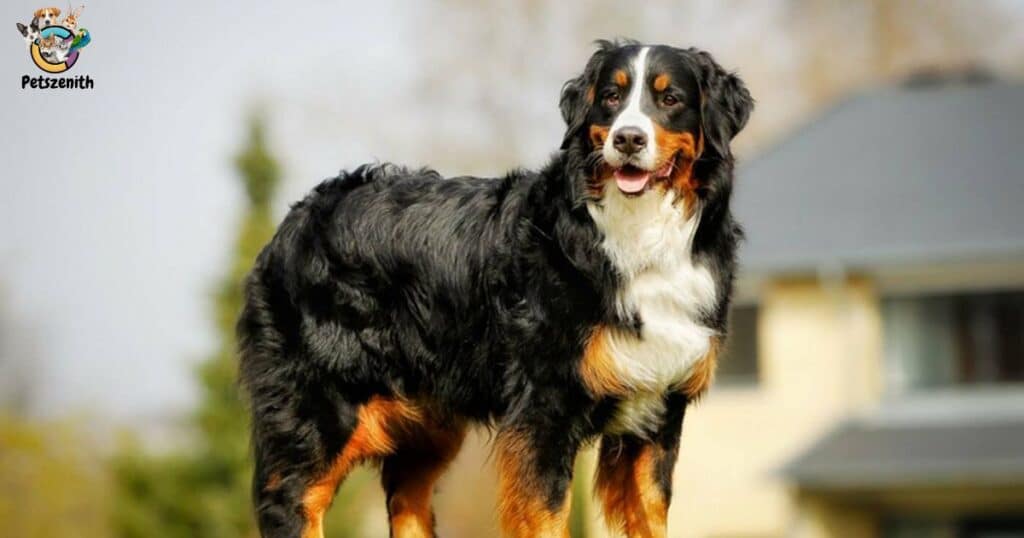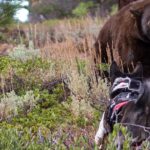If you’ve been captivated by the adorable, fluffy charm of the Bernese Mountain Dog, you’re not alone. These gentle giants have soared in popularity, thanks to their striking tri-color coats and affectionate nature. However, before you rush to welcome one into your home, it’s crucial to understand the significant responsibilities and potential challenges that come with owning this breed.
Bernese Mountain Dogs are undeniably beautiful, but they also require a substantial commitment of time, energy, and resources. From their intensive grooming needs to their propensity for various health issues, these dogs may not be the best fit for every lifestyle. In this article, we’ll explore ten compelling reasons why you might want to reconsider getting a Bernese Mountain Dog, especially if you’re unprepared for the demands they can present.
1. Grooming Needs Are Intense
One of the most striking features of the Bernese Mountain Dog is their thick, double-coat that sheds constantly. While this lush fur is visually appealing, it also means you’ll need to be diligent about grooming. Weekly brushing is an absolute must to control shedding and prevent matting, which can be uncomfortable and painful for your furry friend.
Additionally, their coats require frequent baths to maintain cleanliness, especially if they spend time outdoors. Failing to stay on top of grooming can quickly lead to a household covered in hair tumbleweeds. If you’re not prepared to invest the time and effort (or budget for professional grooming), the Bernese Mountain Dog’s heavy shedding may be more than you bargained for.
2. They Drool… A Lot
Bernese Mountain Dogs are known for their excessive drooling tendencies, which can be both messy and somewhat unappealing to some owners. Imagine having to constantly wipe away drool stains from your furniture, floors, and clothing – it’s a reality that many Bernese owners face.
While some may find a bit of drool endearing, the sheer volume produced by these dogs can quickly become overwhelming. If the thought of constantly cleaning up puddles of saliva doesn’t appeal to you, it might be best to steer clear of this breed.
3. Powerful Chewers and Destructive Tendencies

As puppies, Bernese Mountain Dogs have a strong inclination to chew on just about anything within reach, including furniture, shoes, and other household items. While providing plenty of chew toys can help mitigate this behavior, it’s essential to be prepared for the possibility of costly damage to your belongings.
Even as adults, some Bernese may continue to exhibit destructive tendencies if left alone for extended periods or if they don’t receive enough mental and physical stimulation. If you work long hours or lead a sedentary lifestyle, this breed’s high energy levels and chewing habits could prove problematic.
4. Not Ideal for Apartment Living
Due to their large size and need for ample space, Bernese Mountain Dogs are generally not well-suited for apartment living, especially in smaller units. Confining these energetic dogs to tight quarters can lead to restlessness, excessive barking, and other behavioral issues.
While some owners in apartments or condos may make it work with diligent exercise and training, the ideal living situation for a Bernese is a home with a securely fenced yard where they can run, play, and burn off their energy. If you don’t have access to such a space, this breed may not be the best choice.
5. Require Extensive Exercise and Activity
Speaking of energy levels, Bernese Mountain Dogs are known for their high exercise needs. These dogs were originally bred for farm work and require plenty of physical and mental stimulation to remain happy and well-behaved.
Without enough activity, Bernese can quickly become bored and destructive, channeling their energy into unwanted behaviors like excessive barking, digging, or chewing. If you lead a sedentary lifestyle or have limited time for activities like long walks, hikes, or playtime, this breed may not be a good fit for you.
6. Prone to Various Health Issues

Unfortunately, Bernese Mountain Dogs are prone to a range of potentially severe health issues, some of which can be costly to manage and heartbreaking to experience as an owner. Common conditions include:
- Hip and elbow dysplasia: Painful joint disorders that can lead to lameness and mobility issues.
- Cancers: Bernese have a higher risk of developing various forms of cancer, including histiocytic sarcoma and lymphoma.
- Bloat: A life-threatening condition where the stomach twists and becomes distended, requiring immediate veterinary attention.
While reputable breeders strive to minimize the risk of these issues, the reality is that many Bernese Mountain Dogs will experience at least one significant health problem in their lifetime. This can not only be emotionally devastating but also financially burdensome, with medical bills quickly mounting.
7. Not the Best Choice for First-Time Dog Owners
While Bernese Mountain Dogs are known for their gentle, affectionate nature, they can also be strong-willed and stubborn, traits that may make them challenging for first-time dog owners to handle effectively.
Proper training and socialization are essential for this breed, and inexperienced owners may struggle to establish the necessary boundaries and consistency. Without a firm but patient hand, Bernese can become difficult to manage, leading to behavioral issues and potentially dangerous situations.
If you’re a first-time dog owner, it may be wise to consider a breed with a more easygoing temperament and lower maintenance needs, at least initially. Bernese Mountain Dogs often thrive best with experienced owners who understand their unique quirks and requirements.
8. Children and Bernese Mountain Dogs
While Bernese Mountain Dogs are generally gentle and affectionate with children, their sheer size can pose some risks, especially around younger kids. These large dogs can accidentally knock over toddlers or small children, potentially causing injury.
Close supervision is always necessary when Bernese interact with young children, as even their playful behavior can be overwhelming or frightening for little ones. Additionally, their strength and size may make them less than ideal for homes with infants or very young toddlers who are still developing their motor skills and spatial awareness.
9. Steep Costs of Owning a Bernese

Acquiring a Bernese Mountain Dog from a reputable breeder can be expensive, with prices often ranging from $1,000 to $2,500 or more. However, the initial purchase price is just the beginning – owning one of these dogs comes with significant recurring costs.
From high-quality food to regular grooming, veterinary care, and supplies like toys and bedding, the yearly expenses of maintaining a Bernese Mountain Dog can quickly add up. According to some estimates, the annual cost of owning this breed can range from $1,500 to $3,000 or higher, depending on factors like location and individual health needs.
It’s crucial to carefully consider whether your budget can accommodate these step costs before committing to a Bernese Mountain Dog.
10. Emotional Toll When They Pass
One of the most heartbreaking aspects of owning a Bernese Mountain Dog is their relatively short lifespan. While individual cases may vary, the breed generally lives between 6 and 8 years on average – a tragically brief time compared to many other dog breeds.
Losing a beloved family member so quickly can be an emotionally devastating experience, and the intense grief that follows can be challenging to navigate. If you’re someone who forms deep bonds with pets, the knowledge that your time together will be limited may be something to deeply consider before committing to a Bernese Mountain Dog.
| Breed Characteristic | Description |
| Size | Large (70-115 lbs) |
| Coat | Thick, double-coat that sheds heavily |
| Grooming Needs | High (weekly brushing, frequent bathing) |
| Exercise Requirements | High (at least 1 hour of exercise per day) |
| Energy Level | High |
| Trainability | Moderate (can be stubborn) |
| Friendliness | High (gentle with families) |
| Health Concerns | Hip/elbow dysplasia, cancers, bloat |
| Lifespan | 6-8 years |
| Annual Costs | $1,500 – $3,000+ |
While the Bernese Mountain Dog is undoubtedly a beautiful and loving breed, the decision to welcome one into your life should not be taken lightly. These dogs require a significant commitment of time, energy, and resources that may not align with every lifestyle or living situation.
From their intensive grooming needs and propensity for shedding to their higher risk of health issues and relatively short lifespan, owning a Bernese comes with unique challenges that prospective owners must be prepared to face.
It’s essential to carefully consider your living arrangements, activity levels, financial capacity, and emotional readiness before bringing one of these gentle giants into your home. While their affectionate nature and striking appearance are undeniably appealing, their unique needs may make them ill-suited for some households.
Case Study: The Thompsons’ Experience with a Bernese Mountain Dog

The Thompson family had long admired the regal beauty of the Bernese Mountain Dog and finally decided to add one to their household after extensive research. However, despite their best efforts, they soon found themselves overwhelmed by the breed’s demands.
Maddie was the sweetest dog, but her shedding was out of control, recalls Sarah Thompson. We were constantly vacuuming and finding tufts of hair everywhere, even in our food sometimes.
The family also struggled with Maddie’s high energy levels and exercise requirements, as both parents worked long hours. She started becoming destructive when left alone, chewing on furniture and digging holes in the backyard, Sarah explains.
Tragically, at just six years old, Maddie was diagnosed with an aggressive form of cancer, and the Thompsons were faced with the heartbreaking decision to let her go.
The emotional toll of losing her so soon was devastating, Sarah says. If we had known how short her lifespan would be, we might have reconsidered getting a Bernese Mountain Dog.”
While every owner’s experience is unique, the Thompsons’ story highlights some of the potential challenges and heartaches that can come with owning this breed.
Ultimately, the decision to get a Bernese Mountain Dog should be made with a clear understanding of their needs and a willingness to commit to their care and well-being fully. For those prepared to take on the responsibility, these gentle giants can make wonderful companions. However, for others, a different breed may be a better fit for their lifestyle and circumstances.
By carefully considering the factors outlined in this article, you can make an informed decision about whether a Bernese Mountain Dog is truly the right choice for you and your family.
While the challenges of owning a Bernese Mountain Dog are significant, it’s important to note that every breed comes with its own set of demands. The key is to thoroughly research and understand what a particular breed requires before making the commitment.
For those who are undeterred by the grooming needs, exercise requirements, and potential health issues of the Bernese Mountain Dog, there are certainly rewarding aspects to owning this breed as well.
One of the most endearing qualities of the Bernese Mountain Dog is their gentle, affectionate nature. Despite their large size, they are known for being incredibly patient and loving with children, making them excellent family companions in the right circumstances.
Additionally, their intelligence and eagerness to please (when properly trained) can make them highly responsive and obedient dogs for owners willing to invest the time and effort into their training and socialization.
Grooming Challenges: A Closer Look
While the Bernese Mountain Dog’s grooming needs are undoubtedly demanding, it’s worth taking a closer look at what’s involved and some strategies for managing their coat.
Regular brushing is essential to prevent matting and keep shedding under control. A slicker brush and undercoat rake are invaluable tools for tackling their thick double coat. Setting aside 30-60 minutes once or twice a week for a thorough brushing session can make a significant difference.
Bathing is also crucial, with many owners opting for professional grooming every 6-8 weeks to keep their Bernese looking and smelling fresh. At-home baths with a high-quality dog shampoo can also help maintain their coat between professional groomings.
Furthermore, regular nail trims, ear cleaning, and dental care are all part of the grooming routine for this breed.
While the commitment to grooming is undeniably high, many Bernese Mountain Dog owners find the process to be a bonding experience with their furry companions. With the right tools and dedication, it’s possible to stay on top of their grooming needs and enjoy their stunning coats.
For those considering a Bernese Mountain Dog, it’s crucial to carefully weigh the pros and cons and ensure that you have the time, resources, and emotional fortitude to provide them with the care they require. While they may not be the right fit for everyone, for the right owner, these gentle giants can make loyal, loving, and rewarding companions.
Exercise and Mental Stimulation: Key to a Happy Bernese

One of the most important aspects of owning a Bernese Mountain Dog is providing them with ample exercise and mental stimulation. These intelligent and energetic dogs were bred for farm work, and without sufficient physical and mental outlets, they can become restless, destructive, and prone to behavioral issues.
Regular daily walks or hikes are a must, with many owners aiming for at least an hour of exercise per day. However, it’s not just about physical activity – mental stimulation through activities like puzzle toys, obedience training, and interactive games is equally important.
Failure to meet a Bernese Mountain Dog’s exercise and mental enrichment needs can lead to a host of problems, including:
- Excessive barking or whining
- Destructive chewing or digging
- Hyperactivity and difficulty settling down
- Anxiety or separation-related issues
- Stress and frustration-related behaviors
For owners with active lifestyles and plenty of time to dedicate to their furry companion, meeting these needs may be manageable. However, for those with more sedentary routines or limited time, the exercise and stimulation requirements of a Bernese Mountain Dog may prove too demanding.
It’s essential to honestly evaluate your lifestyle and whether you can realistically provide the necessary physical and mental outlets for this breed before committing to ownership.
Frequently Asked Questions
Are Bernese Mountain Dogs good family dogs?
While Bernese Mountain Dogs are known for their gentle and affectionate nature with children, making them seem like ideal family pets, there are some important considerations. Their large size means they can accidentally knock over small children, so close supervision is always required. Additionally, their high grooming needs, exercise requirements, and potential for various health issues may make them challenging for some families to manage properly.
How much do Bernese Mountain Dogs shed?
Bernese Mountain Dogs are heavy shedders due to their thick, double coats. They shed year-round, but typically experience more intense shedding during seasonal changes. Regular weekly brushing and frequent bathing are essential to control shedding and prevent matting. Many owners find that vacuuming and lint-rolling become daily tasks when living with a Bernese.
Are Bernese Mountain Dogs good apartment dogs?
No, Bernese Mountain Dogs are generally not well-suited for apartment living, especially in smaller spaces. Their large size and high energy levels require ample room to move around and burn off excess energy. Confinement in tight quarters can lead to restlessness, barking, and destructive behaviors. A home with a securely fenced yard is better suited for this breed.
How much exercise do Bernese Mountain Dogs need?
Bernese Mountain Dogs have high exercise needs and require at least 1-2 hours of vigorous exercise per day, such as long walks, hikes, or playtime in a securely fenced area. Without enough physical and mental stimulation, they can become destructive or develop behavioral issues. Their exercise requirements make them less suitable for sedentary or extremely busy owners.
How long do Bernese Mountain Dogs typically live?
Sadly, Bernese Mountain Dogs have a relatively short lifespan compared to many other breeds. Their average life expectancy is between 6-8 years, with some living up to 10 years with proper care. This brief lifespan can be emotionally devastating for owners who form strong bonds with their pets.
Are Bernese Mountain Dogs easy to train?
Bernese Mountain Dogs can be moderately challenging to train due to their stubborn and independent nature. They are intelligent but may require patience and consistency from experienced owners during the training process. Early socialization and positive reinforcement training methods are recommended for this breed.
Conclusion
The Bernese Mountain Dog is a breed that demands serious consideration before taking the plunge into ownership. Their adorable looks and affectionate nature are incredibly alluring, but behind that fluffy exterior lies a significant commitment of time, energy, and resources. From intensive grooming to manage their heavy shedding to a higher risk of costly health issues and a heartbreakingly short lifespan, these dogs require an unwavering level of dedication that may not suit every lifestyle.
While Bernese Mountain Dogs can undoubtedly make wonderful companions for the right owners, they are not a breed to be taken lightly. It’s crucial to honestly evaluate your living situation, activity levels, financial capacity, and emotional readiness before welcoming one of these gentle giants into your home. For those unprepared for the demands, a different breed may ultimately prove to be a better fit. By carefully considering the unique needs of the Bernese Mountain Dog, you can make an informed decision that leads to a rewarding and fulfilling relationship with your furry family member.

Davin Connor is an experienced author with 3 years in pets writing. Known for concise, informative content, he shares expertise on pet care, behavior, and health through his engaging articles.






